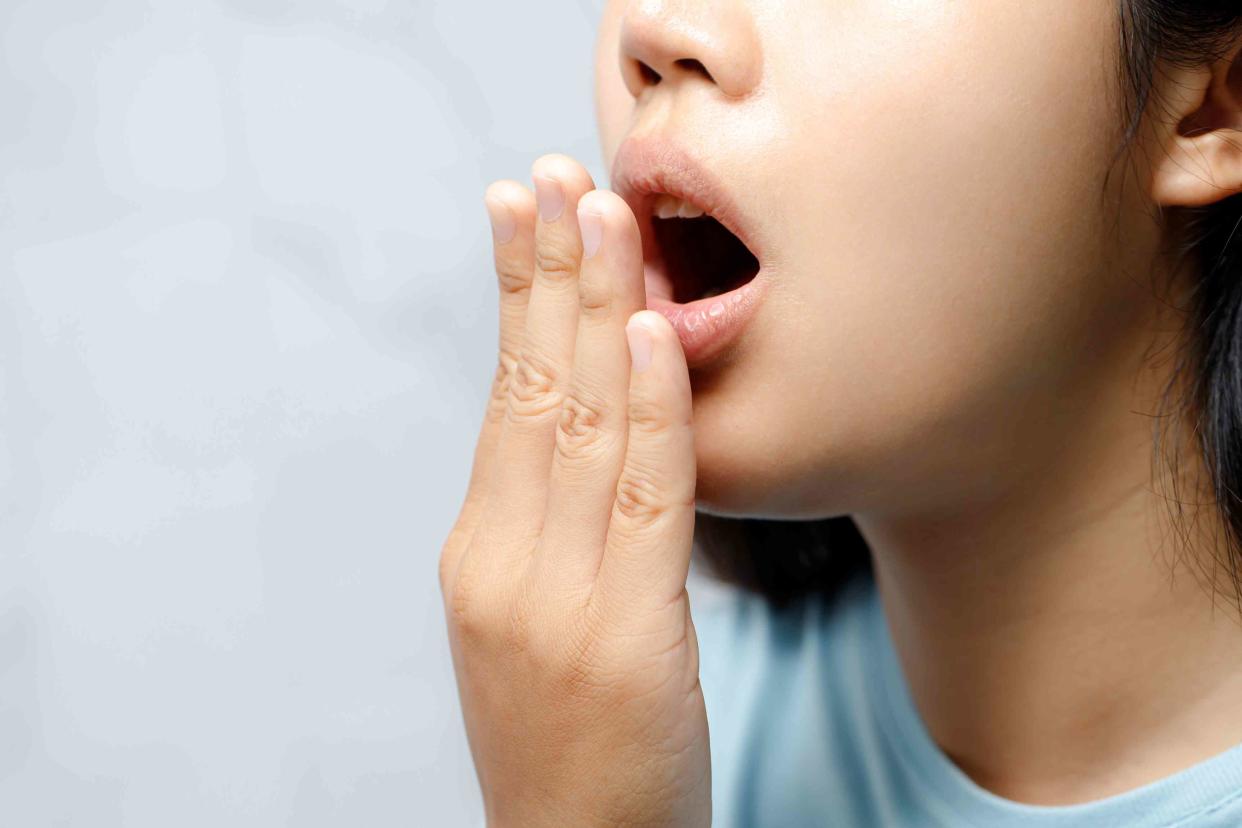Can Probiotics Cure Bad Breath?

Fact checked by Nick Blackmer
Key Takeaways
Bad breath, also known as halitosis, can be embarrassing and hard to get rid of. It’s often caused by an imbalance of bacteria in the oral microbiome.
New research suggested that probiotics can help to restore the balance of good bacteria in the mouth and fight bad breath.
Since bad breath can be caused by things like an underlying health or dental condition that needs specific treatment, probiotics may not work for everyone.
Halitosis—more commonly known as “bad breath”—can have many causes. The foods you eat and the beverages you drink, habits like smoking, and dental problems can all contribute to stinky breath.
According to Alexa Martin, DMD, a board-certified endodontist, the real culprit behind bad breath is an imbalance of “good” and “bad” bacteria in your mouth.
If you notice your breath smells, Martin said that means “bad bacteria are thriving and building up, and the good bacteria are minimized.”
Just as probiotics can help balance bacteria in the gut, research suggests they can restore imbalances in the mouth. Here’s how that works—and where it falls short.
Learn More: Why Do You Have Bad Breath?
Evidence for Probiotics
A study published late last year found that probiotics may help with halitosis by reducing the levels of substances that cause bad breath (volatile sulfur compounds) in the participants.
Lactobacillus reuteri, Lactobacillus salivarius, Weissella cibaria, and Streptococcus salivarius were the probiotics included in the study. The participants took them in various forms like chewing gums, tablets, capsules, or bags with powder that were dissolved in the mouth, but you can also get these probiotics by eating fermented foods such as yogurt, sourdough bread, and miso soup.
Another review that was published in 2022 also showed that some probiotics might offer some benefits for bad breath caused by oral factors. However, experts say that more research is needed.
Learn More: What Causes Bad Breath (Halitosis)?
How Bad Breath Bacteria Builds Up
Bad breath can be caused by oral or non-oral factors.
Oral causes can include eating certain foods, such as dairy products, “whose byproducts are stinky sulfur-containing compounds,” Martin said.
Low-pH foods like lemon water and citrus fruits can also create an acidic environment for bacteria in our mouths to thrive in.
Your oral hygiene habits matter, too. Not brushing and flossing enough allows bacteria to build up on the pieces of food left in your mouth. These bacteria then put out sulfur compounds that make your breath smell.
“It’s what you eat, it’s your gut flora, it’s the food that builds up between your teeth when you’re not flossing that breaks down into sulfur-containing byproducts that send our equilibrium out of control to the point that tongue scraping and mouthwash can no longer neutralize the smell,” said Marin.
There are also a lot of non-oral factors that can cause bad breath, some of which you may not have a lot of control over. For example, taking certain medications or having health conditions like gum disease, chronic acid reflux, diabetes, seasonal allergies, respiratory tract infections, and gastrointestinal conditions can all contribute to bad breath.
Learn More: Prebiotics vs. Probiotics vs. Postbiotics: What's Best for You?
Probiotic Potential
Experts think that probiotics could be an effective solution for bad breath that’s caused by a buildup of bacteria that release those stinky sulfur compounds.
Sean Kutlay, DDS, a specialist in cosmetic and implant dentistry, told Verywell that a possible reason why probiotics would help is their ability to modulate the microbiome.
“It is known that halitosis can be caused by an imbalance in oral microbiota, and probiotics may help restore this balance,” he said.
Martin added that probiotics contain the kind of bacteria that protect our gums, teeth, and tongue—the same natural bacteria that are found in a healthy mouth (Streptococcus). The bacteria help with bad breath by neutralizing acids from the bacteria and preventing more of the bad bacteria from growing.
“Supplementing with a mouthwash that contains probiotics, taking probiotics, and keeping your mouth clean will all help strengthen your oral microbiome,” Martin said. “Eating something like spaghetti with garlic isn’t a big deal, and your body can properly metabolize and digest it.”
Learn More: Everything You Need to Know About Probiotics
When Probiotics Aren’t Enough
Kutlay said that it’s important to note that probiotics won’t work for all causes of bad breath. Habits like brushing, flossing, and tongue scraping are still very important for maintaining your oral hygiene.
Bad breath that hangs around and doesn’t seem to get better no matter how great you are at brushing and flossing could be a sign that something else is going on.
“In some cases, bad breath may also be a symptom of an underlying health problem,” Kutlay said. “And it is important to address the root cause.”
In that case, figuring out the cause and treating it should help with bad breath. For example, if your bad breath is caused by gum disease, Kutlay said that treating it with a deep cleaning, antibiotics, or surgery could help clear it up.
The same goes for a health problem somewhere else—for example, a GI condition like acid reflux that can be treated with medication and lifestyle changes.
What This Means For You
Adding probiotics to your oral health routine could help with bad breath, which is often caused because the balance of bacteria in your mouth is off. However, bad breath can also be caused by underlying dental or health problems and won’t get better until those conditions are treated.
Read Next: Home Remedies for Bad Breath

